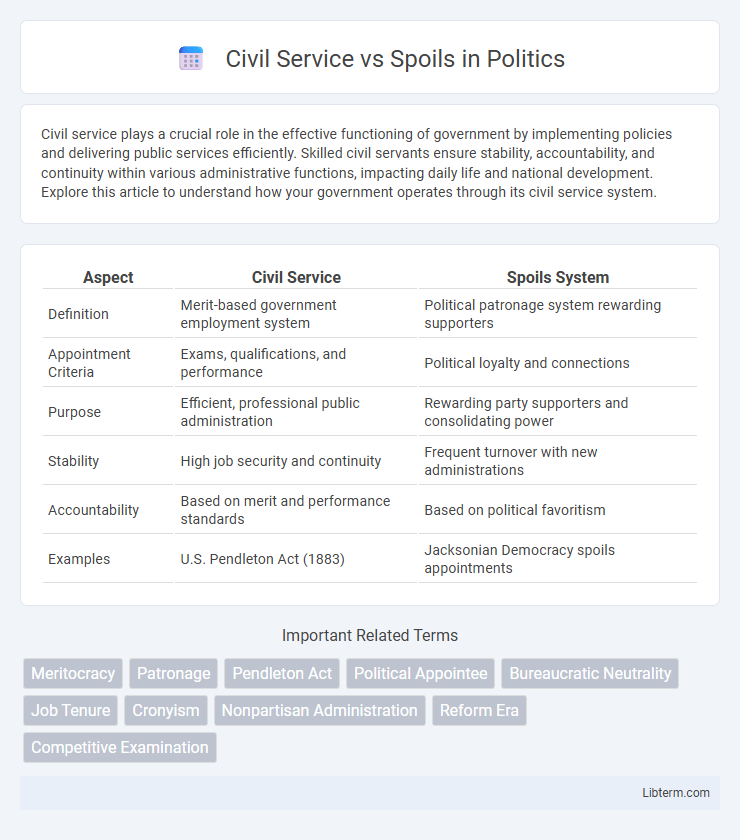Civil service plays a crucial role in the effective functioning of government by implementing policies and delivering public services efficiently. Skilled civil servants ensure stability, accountability, and continuity within various administrative functions, impacting daily life and national development. Explore this article to understand how your government operates through its civil service system.
Table of Comparison
| Aspect | Civil Service | Spoils System |
|---|---|---|
| Definition | Merit-based government employment system | Political patronage system rewarding supporters |
| Appointment Criteria | Exams, qualifications, and performance | Political loyalty and connections |
| Purpose | Efficient, professional public administration | Rewarding party supporters and consolidating power |
| Stability | High job security and continuity | Frequent turnover with new administrations |
| Accountability | Based on merit and performance standards | Based on political favoritism |
| Examples | U.S. Pendleton Act (1883) | Jacksonian Democracy spoils appointments |
Introduction to Civil Service and Spoils System
The Civil Service system establishes a merit-based framework for government employment, ensuring hiring and promotions are based on qualifications and competitive exams. In contrast, the Spoils System awards public office to political supporters and loyalists as a form of patronage, often leading to inefficiency and corruption. The transition from Spoils to Civil Service reforms, such as the Pendleton Act of 1883, aimed to promote professionalism and accountability in federal employment.
Historical Origins of Both Systems
The civil service system originated during the Han Dynasty in China, where merit-based examinations were used to select government officials, setting a precedent for bureaucratic professionalism. In contrast, the spoils system, popularized in the United States during Andrew Jackson's presidency in the 1820s, awarded government jobs to political supporters as a reward for loyalty. These historical origins highlight the fundamental difference: civil service emphasizes expertise and qualifications, while the spoils system prioritizes political allegiance.
Core Principles of the Civil Service System
The Civil Service System is grounded in merit-based principles, ensuring government positions are awarded based on qualifications and competitive examinations rather than political connections. It emphasizes impartiality, professional competence, and continuity of public service to promote efficiency and fairness within government operations. By contrast, the spoils system prioritizes political loyalty and patronage, often compromising the integrity and effectiveness of public administration.
Fundamentals of the Spoils System
The Spoils System, fundamental to 19th-century American politics, emphasized rewarding political supporters with government jobs, prioritizing loyalty over merit. This practice often led to inefficiency and corruption within public administration due to unqualified appointees. Contrastingly, the Civil Service System was established to promote merit-based hiring through exams and qualifications, aiming to ensure competence and reduce partisan favoritism.
Key Differences Between Civil Service and Spoils System
The Civil Service system emphasizes merit-based hiring and promotions through competitive exams and qualifications, ensuring efficiency and professionalism in government roles. In contrast, the Spoils System relies on political patronage, awarding jobs to loyal supporters regardless of expertise, often leading to corruption and inefficiency. Key differences include transparency, job security, and the foundation of appointment criteria--merit versus political loyalty.
Advantages of the Civil Service Approach
The Civil Service approach offers greater job stability and merit-based advancement, leading to a more competent and professional workforce. It reduces political patronage and corruption by ensuring appointments and promotions are based on qualifications rather than party loyalty. This system enhances government efficiency and public trust by fostering consistency and accountability in public administration.
Drawbacks of the Spoils System
The Spoils System often leads to unqualified individuals filling government positions due to appointments based on political loyalty rather than merit. This practice undermines the efficiency and effectiveness of public administration, causing potential corruption and patronage abuses. Frequent turnover with each administration disrupts continuity and policy implementation, weakening long-term governmental stability.
Impact on Government Efficiency and Integrity
The civil service system enhances government efficiency by promoting merit-based hiring, ensuring skilled and qualified personnel occupy public offices, which reduces corruption and patronage. The spoils system, conversely, often leads to inefficiency and decreased integrity as political appointments prioritize loyalty over competence, fostering nepotism and mismanagement. Sustainable governance relies on civil service reforms to maintain accountability, transparency, and consistent policy implementation in public administration.
Modern Reforms and Evolution of Both Systems
Modern civil service reforms emphasize merit-based recruitment and standardized examinations to enhance efficiency and minimize corruption, reflecting a shift from the traditional patronage system. The spoils system, historically marked by political appointments and favoritism, has largely diminished due to legal frameworks like the Pendleton Civil Service Reform Act, promoting professionalism and stability in government roles. Continuous evolution in civil service prioritizes transparency and accountability, contrasting with the spoils system's reliance on partisan loyalty.
Conclusion: Choosing the Right Approach
Selecting the ideal governance system requires balancing merit-based civil service methods with the political loyalty emphasized in spoils systems. Civil service promotes efficiency, transparency, and professional expertise, while spoils systems prioritize political alignment and patronage. Ultimately, sustainable and effective public administration thrives on meritocracy, minimizing corruption and enhancing service delivery to citizens.
Civil Service Infographic

 libterm.com
libterm.com